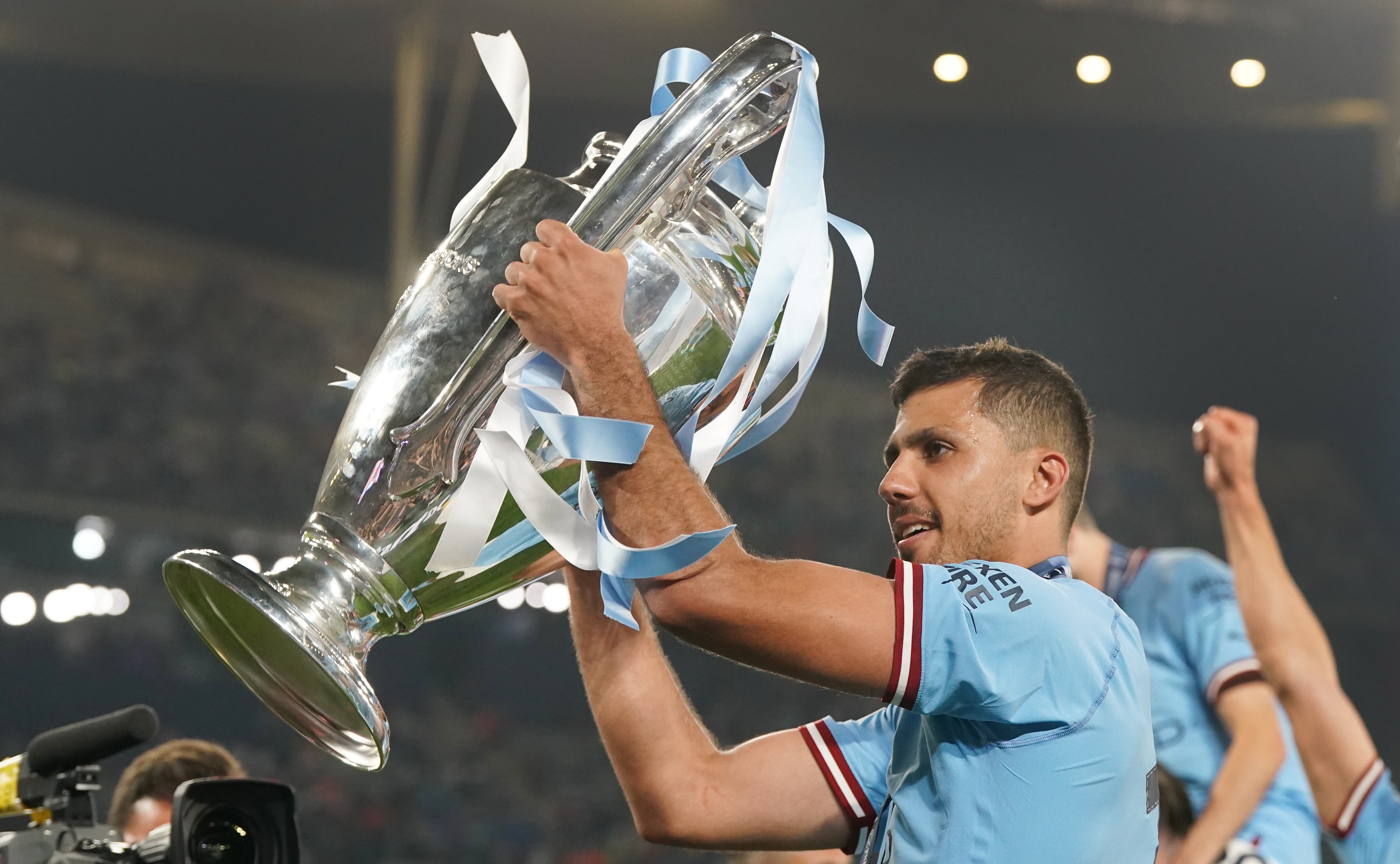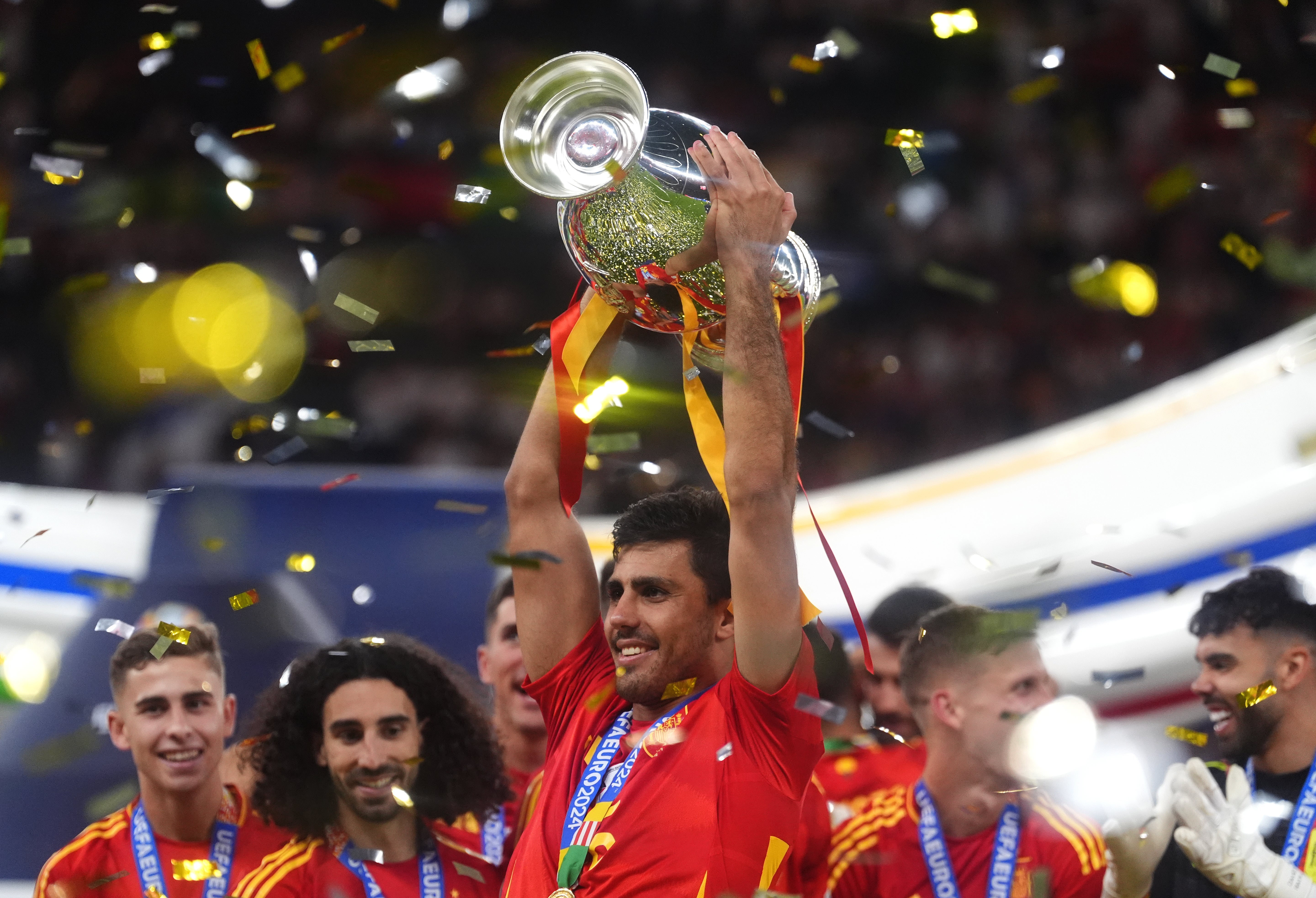
There has been one goalkeeper, Lev Yashin, and a trio of defenders, though Fabio Cannavaro was more of a stopper than the German midfielders, Franz Beckenbauer and Matthias Sammer, who were converted into sweepers. But there has never been a defensive midfielder. The Ballon d’Or is almost seven decades old and Rodri, the man who earned Manchester City their first Champions League, could be a history maker in another respect.
A trophy that had seemed the private property of Lionel Messi and Cristiano Ronaldo for a decade and a half may have an unlikely winner. Rodri ranks as second favourite, behind Vinicius Junior, for a prize he never imagined he might secure, despite suffering a season-ending knee injury last month.
But then why would he? The Ballon d’Or has tended to be reserved for forwards and flair players. His job description entails unselfishness. The defensive midfielder is constructed to allow others to get the glory. And yet the paradox of Rodri is that he has reached such a standard, achieved so much himself for his respective teams, that the spotlight has shone back onto him.
As City open their Champions League campaign, it is with a reminder of a moment that propelled Rodri into contention: a few years ago, when debating who Ronaldo and Messi’s successor would be, few would have suggested a player hired to be a solid support act to the glitzier talents in Pep Guardiola’s ranks. But when they faced Internazionale in the final in 2023, Rodri’s goal was decisive.

The ultimate team player started to attract the individual accolades. He was named man of the match in the final, the Champions League’s player of the year and then player of the tournament in the 2023 Nations League finals. A year on, Rodri won the same award in Euro 2024 after helping Spain to victory. In between, he won the Golden Ball in the Club World Cup.
“I am very, very happy for everything that happened to me the last years, winning what we won and winning the Euros with my country is just a dream,” he said. “It is just a consequence of working hard and the consistency and never giving up. Individual awards are just a consequence of the work.”
Which reflects his approach. Whereas more egotistical players target them, Rodri is starting to accumulate them. He has become a symbolic figure, but also a celebrated one. The Ballon d’Or represents a rare gap in his trophy collection.
“I really feel now the people is recognising my work and are trying to push me to win it,” he added. “It would be a dream, of course, because I never thought I could arrive to this stage. But once you arrive here you just want people to say what they think, vote and that is it. I will accept whatever it is.”
Some of Rodri’s support comes from his homeland. While Spain won consecutive European Championships either side of their 2010 World Cup triumph, Xavi finished third three times, Andres Iniesta the runner-up in the year he scored the goal that secured the game’s biggest prize. The last Spaniard to win the Ballon d’Or was Luis Suarez in 1960; the only other one was the naturalised Argentinian Alfredo di Stefano.

At City, meanwhile, there was long the sense they were overlooked for individual prizes. That is less true domestically now – four of the last five PFA Player of the Year awards have gone to the Etihad Stadium, although none to Rodri – but they did not have a podium finisher in the Ballon d’Or until Kevin De Bruyne came third in 2022, with Erling Haaland going one better last year when Rodri was placed fifth.
Yet part of the constituency for him comes from football’s other team men, from those accustomed to being unsung heroes, but who make a side tick. Rodri has not merely won four Premier Leagues in as many seasons: he has only lost one game in almost 18 months, this summer’s FA Cup final. Others built their cases around their own goalscoring records and while Rodri has become a scorer of important goals, his is centred on the team’s numbers.
“I know I play a different role from most players that are nominated for these trophies but it also shows that football can be beautiful in different views,” he said. “It can be beautiful playing as a midfielder or scoring goals or being a defender. We know how football works. There are a lot of people that appreciate the role of a midfielder so let’s see what happens.”
Increasing numbers appreciate the role of Rodri: defensive bulwark, the metronome in possession who can play an incisive pass, the scorer in the game when City won the title in two of the last three seasons. He has become the man for the big occasion, but also the player for every occasion. And when the votes come in, he could go where no defensive midfielder has gone before in the Ballon d’Or.







